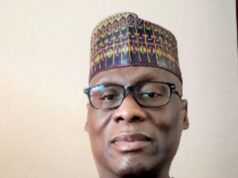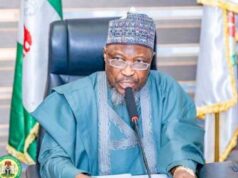
Nigeria’s Vice President, Professor Yemi Osinbajo has given the list of asian countries that have made inroad into Africa.
According to him, Japan launched a $30 billion initiative for Africa recently, while China has also launched a $60 billion initiative on Africa even as South Korea has a $10 billion initiative for Africa and India recently created a $10 billion soft credit window for Africa.
The Vice President, who spoke today, Thursday, in Abuja, at the High-level Public and Private Sector trade and investment facilitation partnership, said that African economies are doing better than ever before, despite a difficult global economic environment.
According to Professor Osinbajo, the GDP growth rate, which averaged 2.2 percent in 2016, is estimated to rise to 3.4 percent this year, and to 4.3 percent in 2018, adding that all such rates are above the global averages. he recalled that last year, 12 African countries grew at above 5 percent while 20 countries grew at between 3 to 5 percent.
“In order to demonstrate the point that resource dependence is no longer the formula for growth, but trade and investments, most of the best performing countries are the non-oil or non-commodity dependent economies. Cote d’Ivoire grew at 8.2%, Ethiopia at 8%, Tanzania at 7.2%, Senegal at 6.7%, and Rwanda and Kenya at 6%, respectively.”
The Vice President said that we are at a watershed moment in Africa, which he described as a time of critical challenges and huge opportunities.
“Our population will equal the population of India and China together by 2050, and some even say much earlier.
“It is evident that the reason for the remarkable success of these economies is good governance, enabling business environment especially for the private sector and markets to thrive, macroeconomic stability, large markets and rising domestic demand and growing Intra- African trade.
“The pace and commitment to reform our economies is also worthy of note. African economies accounted for 30% of all global improvements in business and regulatory reforms in 2016. As you have heard several times already today, and I’m sure you will hear it even more, especially from Nigerian participants, just two days ago the World Bank announced that Nigeria, Africa’s largest economy had moved up 24 places in the World Bank Ease of Doing Business Rankings and we were declared one of the top ten reforming economies in the world.
“The World Bank’s Doing Business 2017 report shows that 34 out of 48 countries in sub Saharan Africa, had at least one business regulatory reform in the previous year.
“Africa is the second fastest growing destination today, for foreign direct investments. In 2016, Foreign Direct Investments to Africa stood at $56.2billion, and is expected to rise to $57.5billion this year.
“It is evident that today, the rest of the world see an Africa that is ready for business, and that will be the place to be in a few short years. And so most of the smart money is dipping its feet more boldly in the waters of African trade and investment.
“It is clear that the world is getting set for the Africa century. But that glorious economic future is underpinned by trade and investment. As we have seen from the economic traumas of the so called resource curse in many of our nations, there is no other pathway for sustainable, job creating growth but trade and investment. This is as true for individual nations, as it is for our region.
“Without prejudice to the strategic value and necessity of multilateralism, never before has regionalism been as important as it is today. It is the starting point for market enlargement, and the locus of our efforts to integrate market structures and establish supply chains.
“We must move from rhetoric to action, in developing our regional infrastructure and regional value chains. We must work collaboratively in regional and multilateral institutions, together with the private sector, to expand markets for trade in goods, services and intellectual property.
“Indeed we must see regionalism and multilateralism as being complementary. The former is an important stepping stone to the latter. In any event, they are for us, vehicles for enhancing development, and must be worked in such a way that they serve the good of our nations and our people.
“Which is why our commitment, and by that, I mean Nigeria’s commitment, is fostering regional integration through ECOWAS which remains very strong indeed, even as we lead the on-going negotiations to conclude by the end of this year, the Continental Free Trade Area (CFTA).
“On the CFTA, there is no plan B for us – we absolutely must succeed! And I must thank Ambassador Albert Muchanga, the Commissioner for Trade and Industry of the AU Commission, for the support, partnership and leadership provided by his team on the CFTA negotiations.
“At the same time, we greatly value our partnership with the WTO, and the excellent and progressive work that the organization has been and is doing. The WTO agreement on trade facilitation came into force this year. Optimism is high, and permit me to quote from an insightful article by Paul Batibonak, who is the focal point of the African group at the WTO for trade facilitation.
“He said that since 2013, African Ministers had noted: “the importance of trade facilitation where our priorities include enhancing infrastructure and boosting productive and trade capacities, in addition to reducing transaction costs, barriers, incentivizing undertaking of reforms and improvements to the customs regulatory systems as well as boosting Intra-African trade.”
“According to WTO’s computable general equilibrium simulations presented in the World Trade Report 2015, export gains from the TFA would be between $750billion and over $1trillion per annum. According to the same source, developing countries and LDCs in particular, would be the main beneficiaries of the “full implementation” of the agreement. And I emphasize “full implementation.
“Developing countries in particular would see their exports increase by 36 percent, much more than for other categories of WTO members. The WTO also predicts that if the TFA is fully implemented, access to foreign markets will increase by 39 percent for developing countries, and 60 percent for LDCs, with potential gains of up to $50trillion per annum for African exports.
“But it will serve us well to pay some attention to the challenges we will confront, in accessing the gains of this facilitation agreement. The significant regulatory, legislative and infrastructural changes that need to be made in accordance with commitments that have been made, come with institutional costs, regulatory costs, infrastructure costs and training costs which may be considerable.
“African trade ministers had clearly flagged that problem and so had urged that developed countries commit and I quote: “to delivering binding, new and long-term technical and financial assistance and capacity building, necessary for African countries to achieve full implementation capacity.”
“Just to repeat that appeal, it will be necessary, in order to ensure the full participation and benefit to be derived by African countries, for developed countries to assist in the way that the African Ministers have suggested.
“The agreement is also important especially as it affords an opportunity to deepen our plans for intra-regional trade and indeed regional economic integration. [1] In particular, we have a unique opportunity to leverage on our commitments to work on customs cooperation, and other elements of trade facilitation and the financing of cross-border infrastructure.
“All in all, we have opportunities here that must be maximized for our individual and regional benefit. This high-level forum could not have come at a more perfect time, for Nigeria, Africa and the global economy.
“We have an opportunity here to have all the key stakeholders in trade and investment, both private sector and public sector in Nigeria, in Africa and the world, under one roof, to deliberate and chart a course forward.
“The Federal Republic of Nigeria looks forward to the outcome of these deliberations, and we fully support all of the initiatives that have been made, including the Global Facilitation Forum and all the other Trade Facilitation Fora and agreements that have been made across the world.
“It is our intention that we benefit and leverage our position to ensure that all our partners and neighbours benefit.”[myad]






